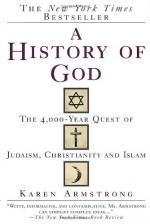
|
| Name: _________________________ | Period: ___________________ |
This test consists of 15 multiple choice questions and 5 short answer questions.
Multiple Choice Questions
1. The Kabbalists still struggled with the problem of ____________.
(a) Jewish mistrust.
(b) Christian intolerance.
(c) Defining the nature of God.
(d) Declining membership.
2. Paradoxically, Armstrong identifies strong movements in all three religions to ____________.
(a) A progressive fundamentalism.
(b) A regressive fundamentalism.
(c) Liberalism.
(d) A conservative orthodox religion.
3. More and more writers and philosophers struggle to develop ideas which might replace ____________.
(a) Islam.
(b) New religions.
(c) The old religions.
(d) Christianity.
4. The greatest example of the coming scientific revolution was ____________.
(a) Da Vinci's study of the human body.
(b) Newton's Law of Gravity.
(c) Da Vinci's study of flight.
(d) Galileo's telescope and his profound insight into the meaning of the earth's place in the universe.
5. In _________, a group of Jews, called Zionists, fled from Russia and settled in Palestine.
(a) 1982.
(b) 1882.
(c) 1782.
(d) 1682.
6. Sigmund Freud considered belief in a God as ____________.
(a) Unusual.
(b) An illusion.
(c) Typical.
(d) Understandable.
7. What removes God from the personal human category to transcend the human attributes?
(a) Fundamental traditions.
(b) Unusual traditions.
(c) Personal traditions.
(d) Mystical traditions.
8. The classic texts of this form of Judaic mysticism were written ____________.
(a) In Assyria in the fifth and sixth centuries.
(b) In Canaan in the fifth and sixth centuries.
(c) In Babylon in the fifth and sixth centuries.
(d) In Jerusalem in the fifth and sixth centuries.
9. In Judaism, mysticism developed in the second and third centuries starting with ____________.
(a) The God of Mysticism.
(b) The Throne Mysticism.
(c) The Throne of God.
(d) The God Incarnate.
10. Kabbalists used _______________ between the essence of God and the God who is revealed by the reality of creation.
(a) The Vedic and Neoplatonic distinction.
(b) The Gnostic and Neoplatonic distinction.
(c) The Vedic and Neopolitan distinction.
(d) The Gnostic and Neoclassical distinction.
11. What are becoming more and more prevalent in Europe today?
(a) Buddhism and Hinduism.
(b) Protestantism and Catholicism.
(c) Atheism and secular ideas.
(d) Islam and Judaism.
12. All three monotheistic religions were forced to develop ____________ traditions?
(a) Fundamental.
(b) Mystical.
(c) Personal.
(d) Unusual.
13. Despite the conservatism occasioned by the rise of _____________ and the suppression of independent reasoning in the Sunni madrasahs, scholars, such as Mulla Sadr (ca 1571-1640), taught a philosophy that fused metaphysics and spirituality.
(a) The Muslim laws.
(b) The Messiah laws.
(c) The Shari laws.
(d) The Shariah laws.
14. By 1492, the last Muslim stronghold in Spain had fallen to ____________.
(a) The Christian forces of Franz Ferdinand.
(b) The Christian forces of Constantine.
(c) The Christian forces of Ferdinand and Isabella.
(d) The Christian forces of Pope John Paul.
15. In Europe, scientists such as _______________, published their own theories as to the meaning and role of God in modern life, while, in England, the physicist Isaac Newton extended his opus magnus "Philosophiae Natruralis Principia" to prove God's existence.
(a) Blaise Pascal and Rene Magritte.
(b) Jacques Pascal and Renee Descartes.
(c) Blaise Pascal and Renee Descartes.
(d) Jacques Pascal and Rene Magritte.
Short Answer Questions
1. Karen Armstrong passionately believes that human beings have, in the 4000 years of the quest delineated in her book, always sought ____________.
2. The scientific work of Charles Darwin and the writings of Marx, Nietzsche, and Freud led to the conclusion that ____________.
3. Darwin's ORIGIN OF THE SPECIES seemed to ____________.
4. Western secularism and the rising dominance of industrialized European countries had a profound effect on ____________.
5. Nietzsche proclaimed that God ____________.
|
This section contains 589 words (approx. 2 pages at 300 words per page) |

|




